 W
WBeowulf is a legendary Geatish hero in the eponymous epic poem, one of the oldest surviving pieces of literature in the English language.
 W
WThe 17th act of the Anglo-Saxon poem Beowulf includes Beowulf's fight with a dragon, the third monster he encounters in the epic. On his return from Heorot, where he killed Grendel and Grendel's mother, Beowulf becomes king of the Geats and rules wisely for fifty years until a slave awakens and angers a dragon by stealing a jeweled cup from its lair. When the angry dragon mercilessly burns the Geats' homes and lands, Beowulf decides to fight and kill the monster personally. He and his thanes climb to the dragon's lair where, upon seeing the beast, the thanes flee in terror, leaving only Wiglaf to battle at Beowulf's side. When the dragon wounds Beowulf fatally, Wiglaf slays it.
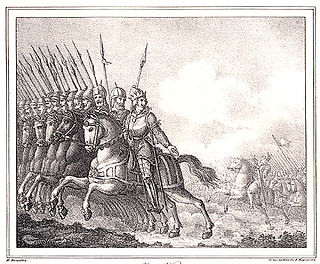 W
WEadgils, Adils, Aðils, Adillus, Aðísl at Uppsölum, Athisl, Athislus or Adhel was a semi-legendary king of Sweden, who is estimated to have lived during the 6th century.
 W
WGrendel is a character in the Anglo-Saxon epic poem Beowulf. He is one of the poem's three antagonists, all aligned in opposition against the protagonist Beowulf. Grendel is feared by all in Heorot but Beowulf. A descendant of Cain, Grendel is described as "a creature of darkness, exiled from happiness and accursed of God, the destroyer and devourer of our human kind". He is usually depicted as a monster or a giant, although his status as a monster, giant, or other form of supernatural being is not clearly described in the poem and thus remains the subject of scholarly debate. The character of Grendel and his role in the story of Beowulf have been subject to numerous reinterpretations and re-imaginings.
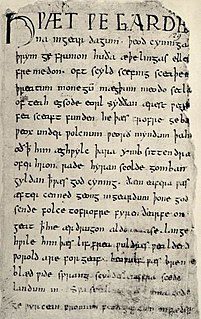 W
WThis list of artistic depictions of Grendel refers to the figure of Grendel. He is one of three antagonists in the Anglo-Saxon epic poem Beowulf.
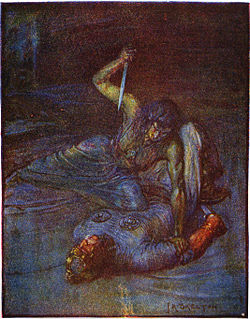 W
WGrendel's mother is one of three antagonists in the anonymous Old English poem Beowulf. The other antagonists are Grendel and the dragon, all aligned in opposition to the hero Beowulf. She is introduced in lines 1258b to 1259a as: "Grendles modor/ides, aglæcwif".
 W
WThis list of artistic depictions of Grendel's mother refers to the figure of Grendel's mother. She is one of three antagonists in the Anglo-Saxon epic poem Beowulf ; she is never given a name in the text.
 W
WHalfdan was a late 5th and early 6th century legendary Danish king of the Scylding (Skjöldung) lineage, the son of king named Fróði in many accounts, noted mainly as the father to the two kings who succeeded him in the rule of Denmark, kings named Hroðgar and Halga in the Old English poem Beowulf and named Hróar and Helgi in Old Norse accounts.
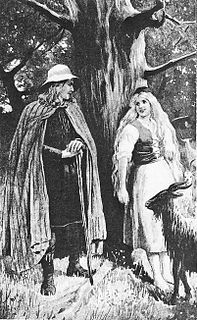 W
WHalga, Helgi, Helghe or Helgo was a legendary Danish king living in the early 6th century. His name would in his own language (Proto-Norse) have been *Hailaga.
 W
WHengist and Horsa are legendary brothers said to have led the Angles, Saxons and Jutes in their invasion of Britain in the 5th century. Tradition lists Hengist as the first of the Jutish kings of Kent.
 W
WHeorogar was a Danish king who appears in the Old English poem Beowulf as the eldest son of Healfdene (Halfdan), and the brother of Hroðgar (Hroar), and Halga (Helgi). The people in parentheses are personages found also in Norse sources.
 W
WHeoroweard is a character who appears in Beowulf and also in Norse legends, where he is named Hjörvarðr or Hiartuar. If he existed in real life, his name would have been Proto-Norse *Heruwarduz.
 W
WHrothgar was a semi-legendary Danish king living around the early sixth century CE.
 W
WHrólfr Kraki, Hroðulf, Rolfo, Roluo, Rolf Krage was a semi-legendary Danish king who appears in both Anglo-Saxon and Scandinavian tradition.
 W
WQueen Hygd, introduced in line 1925 of the poem Beowulf, is the wife of King Hygelac of Geatland. She is the daughter of Hæreth2.
 W
WHygelac was a king of the Geats according to the poem Beowulf. It is Hygelac's presence in the poem which has allowed scholars to tentatively date the setting of the poem as well as to infer that it contains at least some points of historical fact. Beowulf gives Hygelac's genealogy: according to the poem, he was the son of Hrethel and had two brothers Herebeald and Hæþcyn, as well as an unnamed sister who was married to Ecgtheow and mother of the hero Beowulf. Hygelac was married to Hygd, and they had a son Heardred and an unnamed daughter who married Eofor. When Hygelac's brother Hæþcyn was fighting with the Swedes, Hygelac arrived at Hrefnesholt one day too late to save his brother Hæþcyn, but he managed to rescue the surviving Geatish warriors, who were besieged by the Swedish king Ongentheow and his three sons. The Swedes found refuge at a hill fort but were assaulted by the Geats. In the battle, the Swedish king was slain by Eofor. After the death of his brother Herebeald, Hygelac ascended the Geatish throne. After he was killed during a raid on Frisia, Hygelac was succeeded by Heardred, according to Beowulf.
 W
WModthryth, Thryth, and Fremu are reconstructed names for a character who figures as the queen of King Offa in Beowulf.
 W
WOffa is a legendary king of the Angles in the genealogy of the kings of Mercia presented in the Anglo-Saxon Chronicle. He is the son of Wermund and the father of Angeltheow. His name is also mentioned in the Old English poem Widsith. He has been identified with Uffo, a legendary Danish king in the Gesta Danorum by Saxo Grammaticus.
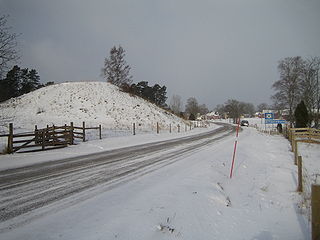 W
WOhthere, Old Norse Óttarr vendilkráka was a semi-legendary king of Sweden of the house of Scylfings, who is said to have lived during the Germanic Heroic Age, possibly during the early 6th century.
 W
WOngentheow was the name of a semi-legendary Swedish king of the house of Scylfings, who appears in Old English sources.
 W
WSkjöldr was among the first legendary Danish kings. He is mentioned in the Prose Edda, in Ynglinga saga, in Chronicon Lethrense, in Sven Aggesen's history, in Arngrímur Jónsson's Latin abstract of the lost Skjöldunga saga and in Saxo Grammaticus' Gesta Danorum. Under the name Scyld he also appears in the Old English poem Beowulf. The various accounts have little in common.
 W
WIn the Old English epic poem Beowulf, Unferth or Hunferth is a thegn of the Danish lord Hrothgar. His name appears four times in the poem, at lines 499, 530, 1165, and 1488, as well as in line 980 by the appellation "the son of Eclafes". The name Unferth does not appear in any Old English manuscript outside of the Nowell Codex, which contains Beowulf, and the meaning of the name is disputed. Several scholarly theories about Unferth have been proposed. Unferth is also the name of a character in the modern novel Grendel by John Gardner, based upon the Beowulf epic.
 W
WWealhþēow is a queen of the Danes in the Old English poem, Beowulf, first introduced in line 612.
 W
WWeohstan, Wēohstān or Wīhstān is a legendary character who appears in the Anglo-Saxon epic poem Beowulf and scholars have pointed out that he also appears to be present in the Norse Kálfsvísa.
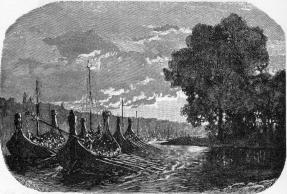 W
WThe Wulfings, Wylfings or Ylfings was a powerful clan in Beowulf, Widsith and in the Norse sagas. While the poet of Beowulf does not locate the Wulfings geographically, Scandinavian sources define the Ylfings as the ruling clan of the Eastern Geats.